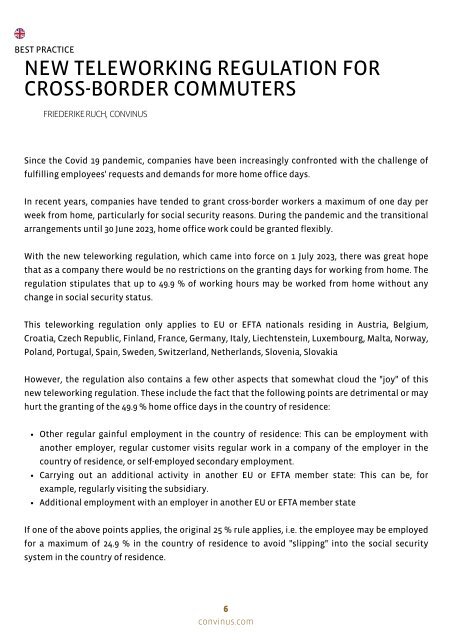CONVINUS Global Mobility Alert - Week 11.2024
You also want an ePaper? Increase the reach of your titles
YUMPU automatically turns print PDFs into web optimized ePapers that Google loves.
BEST PRACTICE<br />
NEW TELEWORKING REGULATION FOR<br />
CROSS-BORDER COMMUTERS<br />
FRIEDERIKE RUCH, <strong>CONVINUS</strong><br />
Since the Covid 19 pandemic, companies have been increasingly confronted with the challenge of<br />
fulfilling employees' requests and demands for more home office days.<br />
In recent years, companies have tended to grant cross-border workers a maximum of one day per<br />
week from home, particularly for social security reasons. During the pandemic and the transitional<br />
arrangements until 30 June 2023, home office work could be granted flexibly.<br />
With the new teleworking regulation, which came into force on 1 July 2023, there was great hope<br />
that as a company there would be no restrictions on the granting days for working from home. The<br />
regulation stipulates that up to 49.9 % of working hours may be worked from home without any<br />
change in social security status.<br />
This teleworking regulation only applies to EU or EFTA nationals residing in Austria, Belgium,<br />
Croatia, Czech Republic, Finland, France, Germany, Italy, Liechtenstein, Luxembourg, Malta, Norway,<br />
Poland, Portugal, Spain, Sweden, Switzerland, Netherlands, Slovenia, Slovakia<br />
However, the regulation also contains a few other aspects that somewhat cloud the "joy" of this<br />
new teleworking regulation. These include the fact that the following points are detrimental or may<br />
hurt the granting of the 49.9 % home office days in the country of residence:<br />
Other regular gainful employment in the country of residence: This can be employment with<br />
another employer, regular customer visits regular work in a company of the employer in the<br />
country of residence, or self-employed secondary employment.<br />
Carrying out an additional activity in another EU or EFTA member state: This can be, for<br />
example, regularly visiting the subsidiary.<br />
Additional employment with an employer in another EU or EFTA member state<br />
If one of the above points applies, the original 25 % rule applies, i.e. the employee may be employed<br />
for a maximum of 24.9 % in the country of residence to avoid "slipping" into the social security<br />
system in the country of residence.<br />
6<br />
convinus.com


















